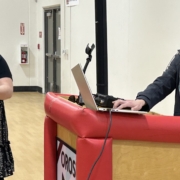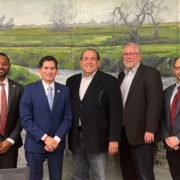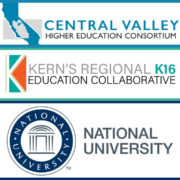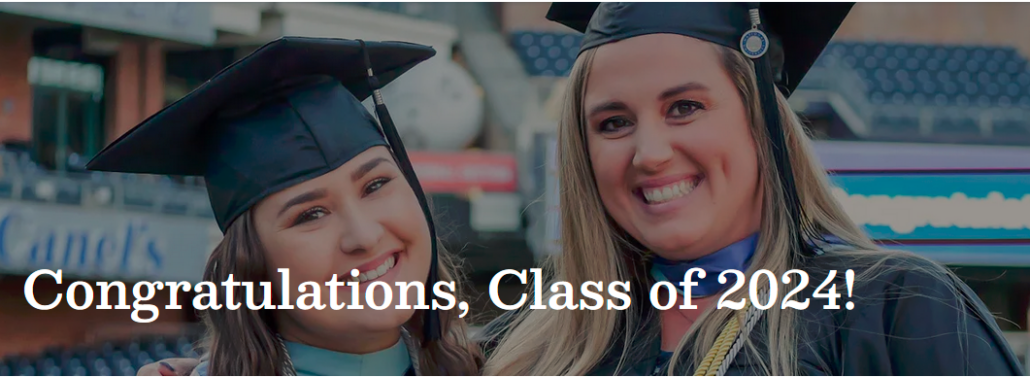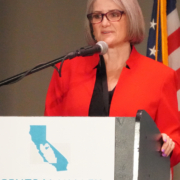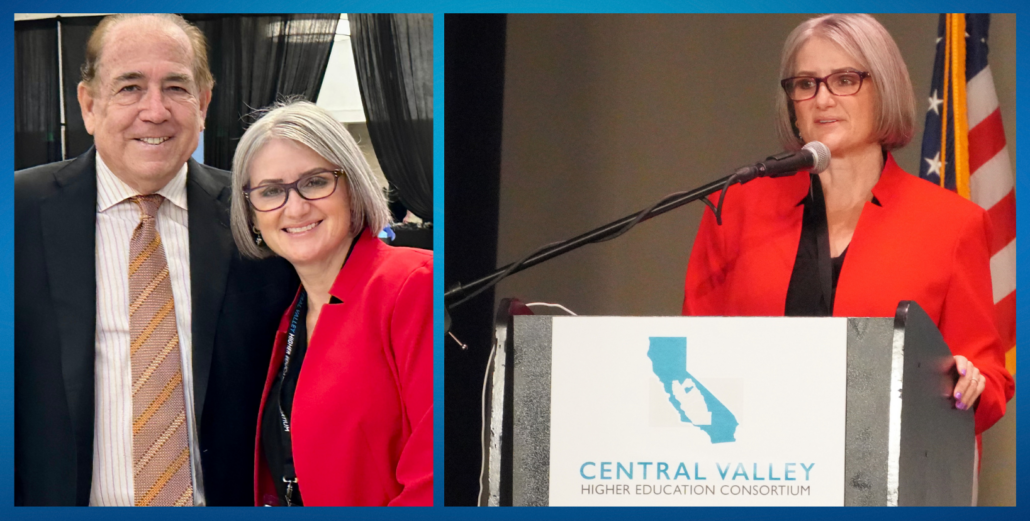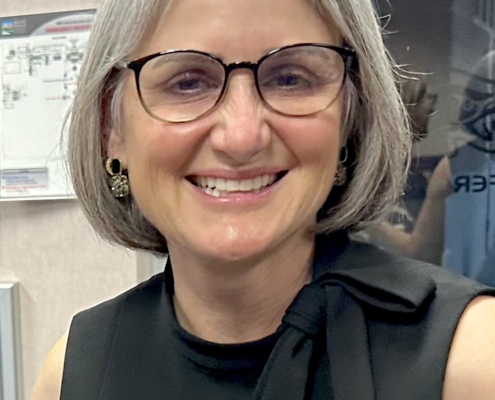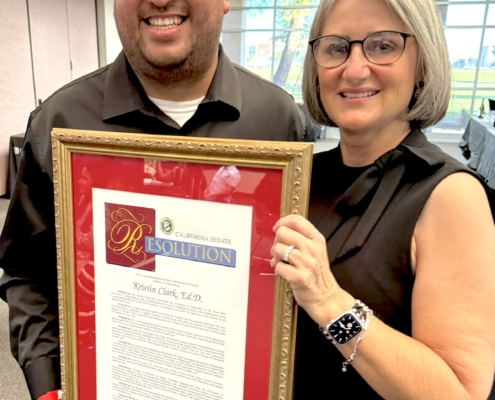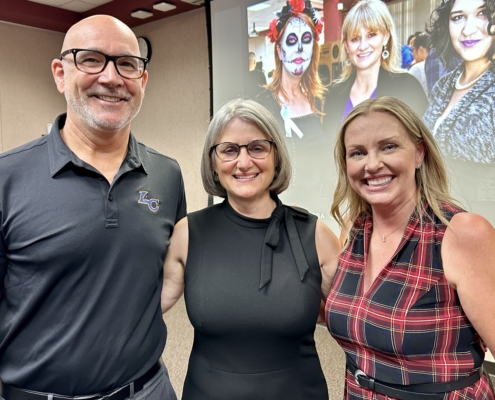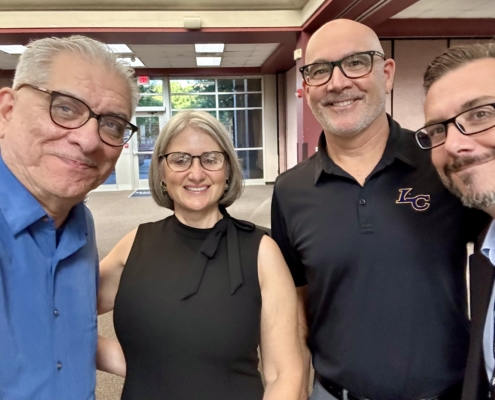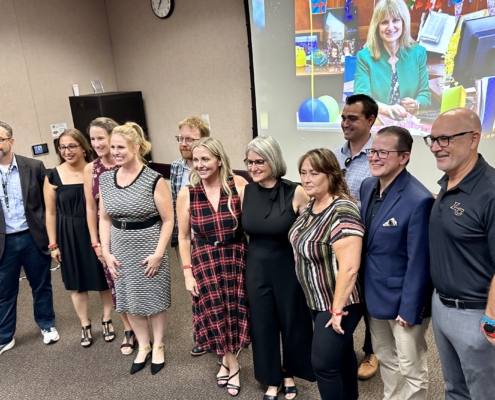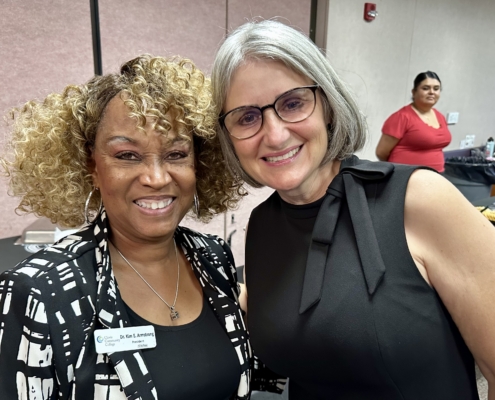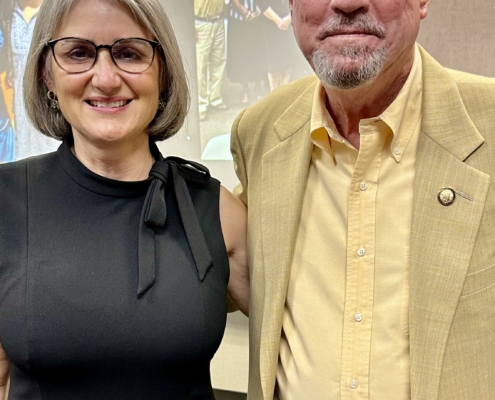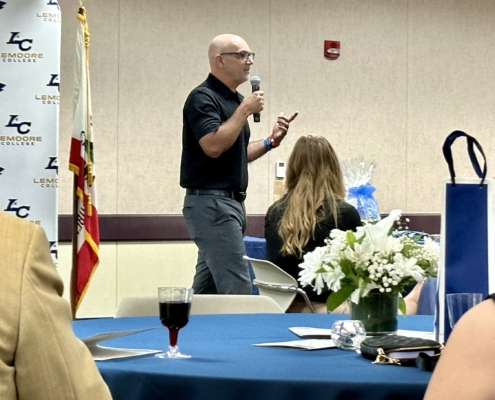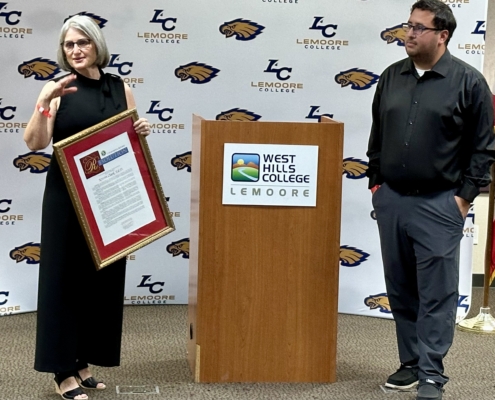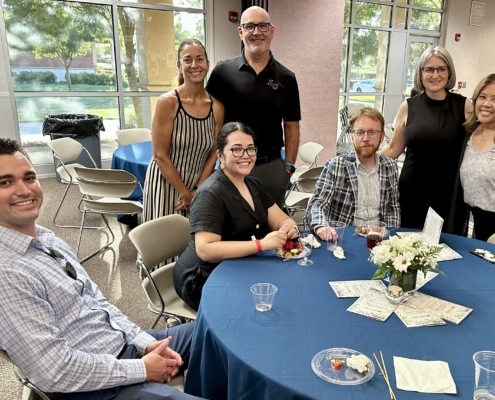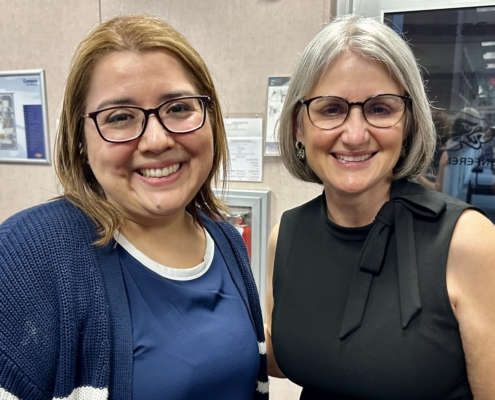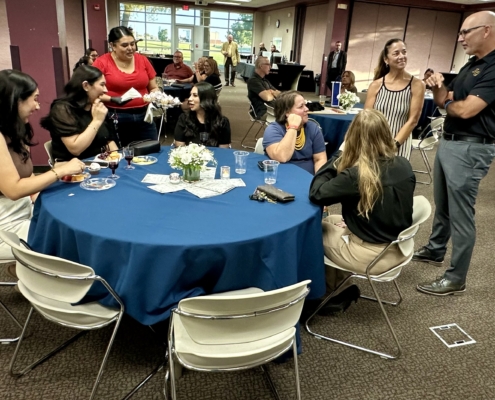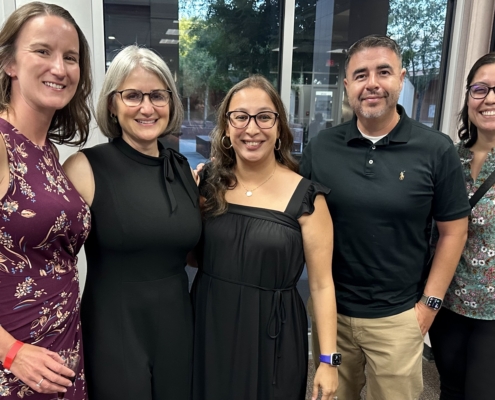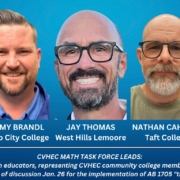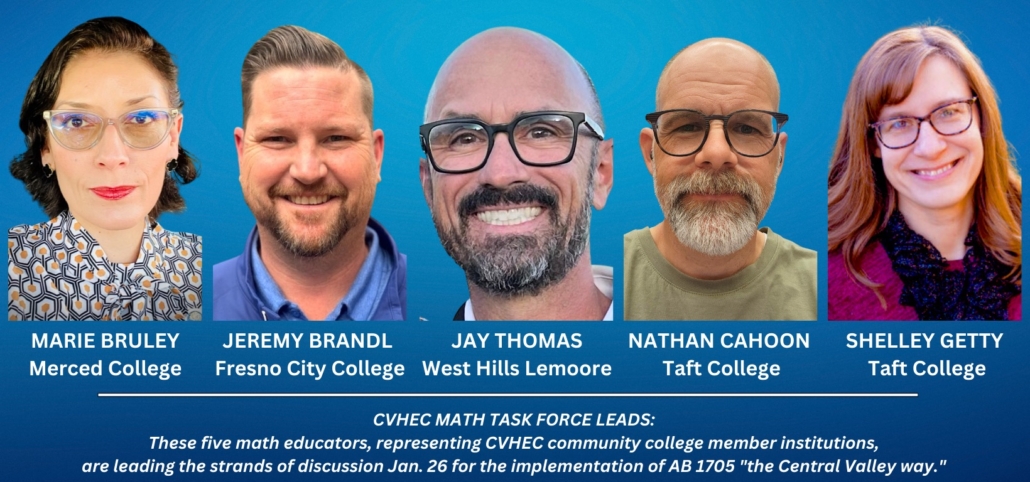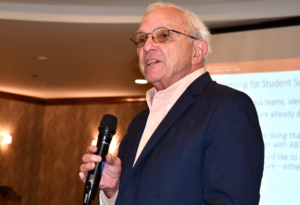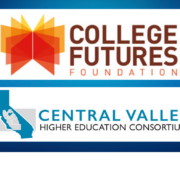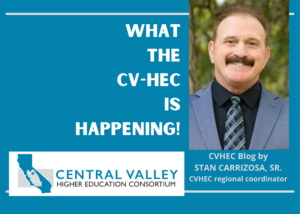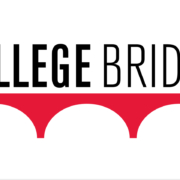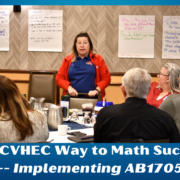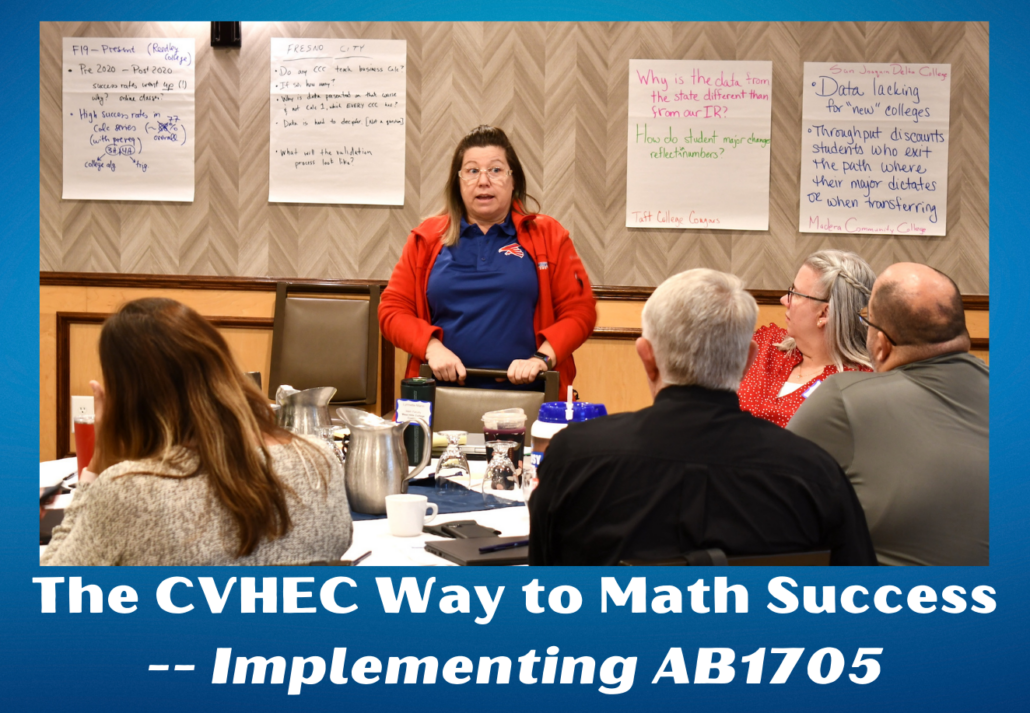Central Valley Transfer Project: valley’s four-year colleges collaborating
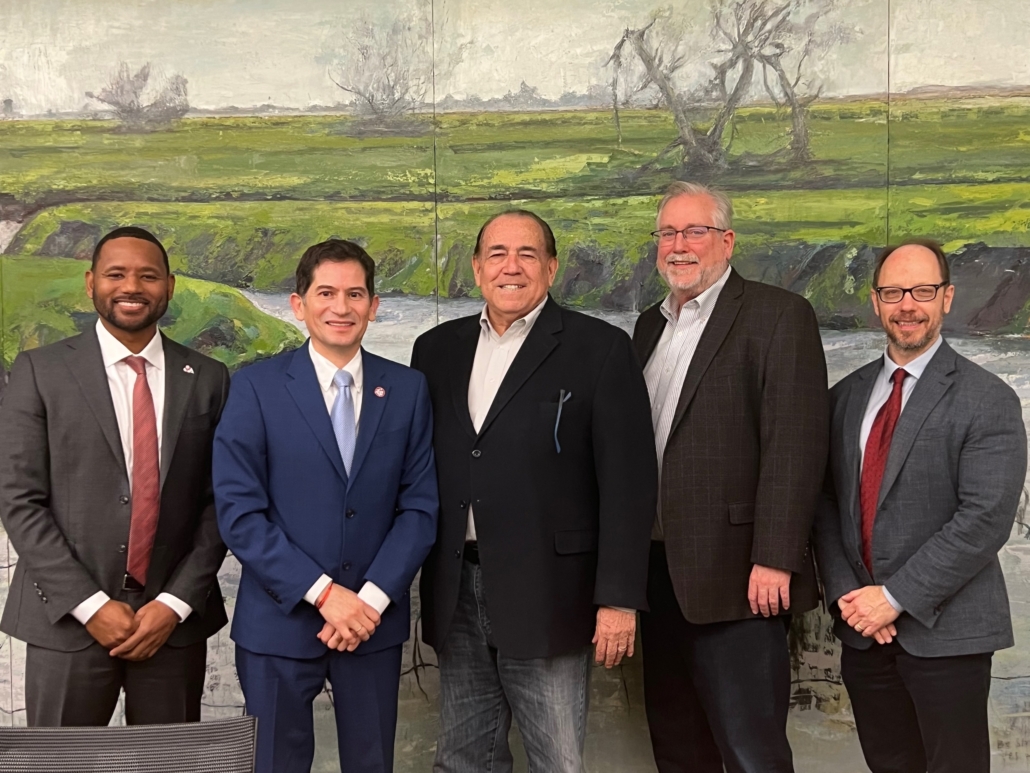
Fresno State, a founding CVHEC member, joined CVHEC’s historic Central Valley Transfer Project in January with (from left): Dr. Kent Willis, vice president of Fresno State Student Affairs and Enrollment Management; University President Saúl Jiménez-Sandoval; Dr. Benjamin Duran, CVHEC executive director; Tom Burke, CVHEC regional coordinator; and Dr. Sergio La Porta, associate dean of the Fresno State College of Arts and Humanities.
Fresno State joins in transfer ‘centerpiece’ with
11 CVHEC community colleges, 3 CSUs, UCMerced
The Central Valley Transfer Project is now partnered with the region’s three California State University campuses after Fresno State signed on in January joining Bakersfield and Stanislaus in the historic Central Valley Higher Education Consortium initiative designed to open new doors for students’ successful transfer from community college.
Along with founding partner University of California, Merced, this means the valley’s four public institutions of higher education are working in unison with 8 community colleges currently through CVHEC’s project using the groundbreaking Program Pathways Mapper software. The project has also gained the full support of the California Community College Chancellor’s Office.
The community colleges already in the CVTP, with several more expected to sign on this year, are: Bakersfield College, Clovis Community College, Madera Community College, Merced College, Porterville College, Reedley College, West Hills College-Coalinga and West Hills College-Lemoore.
The Transfer Project is also expanding participation in the north end of the Central Valley with Modesto Junior College, Columbia College and San Joaquin Delta College scheduled to begin onboard this spring for a total of 11 community college partners said Stan Carrizosa, CVHEC regional coordinator and consortium lead for the project.
All Transfer Project partners are members of the consortium with their respective chancellors and presidents serving on the CVHEC Board of Directors.
“The Transfer Project is now a centerpiece for students to both enter and transfer from community college to their four-year universities,” said Dr. Benjamín Durán, CVHEC executive director. “We are excited to share this latest progress of the project which has been featured statewide and nationally at conferences such as the Community College League of California and Complete College America.”
He added, “This innovative approach is the only one in the state that includes a University of California campus collaborating with partner California State University and community colleges in establishing transfer pathways for Central Valley students to get them to and through college in a timely manner.”
Dr. Saúl Jiménez-Sandoval, Fresno State president and CVHEC board member, said, “I’m proud that Fresno State will be a dynamic partner in the Central Valley Transfer Project, as this pathway will empower community college students to become visionary Bulldogs.”
The Fresno State agreement was finalized Jan. 17 between Durán and President Jiménez-Sandoval, with Tom Burke, CVHEC regional coordinator and Transfer Project team member; Dr. Kent Willis, vice president of Enrollment Services; and Dr. Sergio LaPorta, associate dean of the College of Arts and Humanities.
At CVHEC’s Higher Education Summit last fall, CCC Chancellor Sonya Christian announced that the statewide system has designated the Transfer Project as a demonstration project as set forth in her Vision 2030 for all California community colleges. The Transfer Project’s participating community colleges are serving as the pilot campuses with plans to implement statewide.
Carrizosa said the state budget continues to support and fund the onboarding costs for all community colleges to subscribe to the Program Pathways Mapper.
Established in 2021 with UC Merced, Merced College and Bakersfield College, the project is designed to open new doors for students to successfully transfer from community college with its Program Pathways Mapper, Carrizosa said.
He said the Program Pathways Mapper — a public facing, internet-based app that can be downloaded and accessed by the public software platform — provides unprecedented ease of access for students, counselors, advisors and parents much more so than other existing platforms.
“There are no typical requirements for access to PPM such as other internal college systems like Degree Works, Assist.Org and the CSU Transfer Planner,” he said. “These are all course tracking systems but in order to use them, students need to be successfully enrolled in college and have a student email address or other form of login to try and plan. Through PPM students simply upload the public PPM app to their devices and have immediate access.”
Carrizosa said the PPM helps simplify the transfer planning process which can be the most difficult task for many students.
“In much of our Central Valley region, as many as seven out of 10 incoming college freshmen will be first generation students to attend college,” he said. “Research shows that the most difficult task for them is often the application process itself and completing the required steps for enrollment. Systems like Degree Works and others do nothing to remove this common barrier because these systems cannot be accessed until a student successfully enrolls.”
He explained that a high school student can start the Transfer Project journey as a junior or senior by enrolling in college dual enrollment courses enabling them to complete their transfer level English and Math courses while still in high school. These units roll up with them as they enter community college and track the completion of their lower division requirements for their Associate Degree for Transfer in their chosen major via PPM.
“Students can easily select a community college they wish to attend and a major they want to pursue and the lower division courses required are sequentially laid out for them through the Program Pathways Mapper software.”
In addition, the PPM then links those lower division courses to an upper division institution of the student’s choice and shows a clear sequence of upper division courses needed to complete the degree, Carrizosa added.
“The PPM contains clear and accurate information directly from course catalogues from all participating colleges,” Carrizosa said. “The Central Valley Transfer Project is becoming an alternative continuum of courses to the traditional high school A-G or Career Technical Education continuums and is unprecedented in the state’s community college system. We call it ‘The Central Valley Way!’”
“Through the use of PPM, students complete exactly what is required of them to successfully transfer to their four-year university and they follow PPM through their last two years to degree/certificate completion,” Carrizosa said.
Baseline data results also demonstrate the promise that PPM delivers in the Transfer Project.
In a sample of 5,000 incoming freshmen to Bakersfield College in 2022 the students using the PPM increased their “percentage of on-path course completion” to over 80 percent which also closed the equity gap in this statistic for ethnic minority students when compared to their white counterparts, Carrizosa said.
“The same sample showed students using the PPM reduced the ‘number of units-to-degree’ from an average of 87 down to 67,” he added.
The project is now gearing up to expand the partnership with the College Bridge Math Project and to onboard community colleges from the northern region of the Central Valley.
For more information about the CVTP, contact Carrizosa at centralvalleyhec@gmail.com.
CVHEC media inquiries: Tom Uribes – cvheccommunications@mail.fresnostate.edu or text 559.348.3278.
Fresno State media inquiries: PIO Lisa Bell – lbell@csufresno.edu.
See:
· Pilot CVHEC/UC Merced Transfer Project improves process for students
· CVHEC Web Site Feature: Transfer Project
· Historic Transfer Project spurs statewide movement to increase transfer rates
· HIGHER ED NEWS: College Bridge to expand Math Bridge; CVHEC Transfer Project
• A-G
Kern Master’s Upskilling Program: 2nd cohort graduates – next cohort recruitment underway
Two cohorts from the Kern Master’s Upskilling Program (MA English) are eligible to participate and walk in the 2024 National University Commencement May 18 at Petco Park in San Diego. The program’s high school teacher participants are now qualified to teach English dual enrollment community college courses on their respective campuses. A third English cohort and the first Kern math cohort graduate in June.
Kern Master’s Upskilling Program
reaches another milestone
Second English cohort graduation – recruitment underway for a fall math cohort
The Kern Master’s Upskilling Program for high school teachers seeking a master’s degree in English or Math that qualifies them to teach dual enrollment courses at their respective campuses reached its second milestone last month when 11 participants completed post-baccalaureate requirements in English through National University.
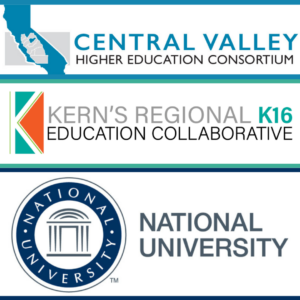 Formally known as the Dual Enrollment Teacher Upskilling Pathway for English and Mathematics, the Central Valley Higher Education Consortium initiative is in partnership with the Kern Regional K-16 Education Collaborative that was funded as part of an $18 million statewide competitive grant in June 2022 to improve student progress from high school to postsecondary education and ultimately into the workforce.
Formally known as the Dual Enrollment Teacher Upskilling Pathway for English and Mathematics, the Central Valley Higher Education Consortium initiative is in partnership with the Kern Regional K-16 Education Collaborative that was funded as part of an $18 million statewide competitive grant in June 2022 to improve student progress from high school to postsecondary education and ultimately into the workforce.
The program also announced recruitment is underway for a third math cohort of 21 students to begin this fall for completion in spring 2026 though Fresno Pacific University in concert with the Kern County Superintendent of Schools (KCSOS), which serves as the administrative agent for the Kern K-16 Collaborative.
Informational meetings are set for March 21 and April 11 at 4:30 p.m.
A potential fourth English cohort pilot through CSU, Bakersfield with seven students is also in the works said Tom Burke, CVHEC’s Kern Masters Upskilling Program lead who reports that the program progress “has been very good” since it was funded two years ago.
“With the first two cohorts of English graduates to be joined by our first cohort of math graduates this summer, we are well on the way to significantly increasing the number of faculty in Kern County eligible to teach dual enrollment or community college courses in math and English,” Burke said.
The January graduation follows the first cohort of 11 English students who graduated in September for the innovative state-funded CVHEC initiative that helps reduce the cost of tuition for high school teachers to pursue a master’s degree, a state requirement to teach community college dual enrollment courses.
Each NU cohort group of students is eligible to participate and walk in the 2024 Commencement services set for Saturday, May 18, at Petco Park in San Diego, said Jessica Gladney, senior director for Partnership Development/ Workforce Education Solutions for National University,
The first Kern Master’s Upskilling Program cohort — MA, English with a specialization in Rhetoric — began in January 2023 with 13 out of 15 students completing their program in November 2023 (nine of the 13 will graduate with honors with a grade point average of 3.85 and above).
The two remaining students are currently in the process of completing their capstone, which is the culminating course of the master’s program, Gladney said.
The second Kern Master’s Upskilling Program cohort of MA, English with a specialization in Rhetoric, began in March 2023, and 10 out of 15 students completed their program in January 2024. The remaining students are currently in the process of completing their capstone course, Gladney reports.
She said each NU cohort group of students is eligible to participate and walk in the 2024 Commencement services set for Saturday, May 18, at Petco Park in San Diego.
“We are proud of these candidates and we are excited to assist with building a qualified candidate pool of eligible dual-enrollment English teachers to meet the workforce demands in the Central Valley,” Gladney said.
CVHEC, made up of 28 institutions of higher education in the valley’s nine-county region from San Joaquin to Kern counties, is one of several partners in the Kern Collaborative.
South Valley CVHEC members include California State University, Bakersfield; Kern Community College District; Bakersfield College; Cerro Coso College; Taft College; Porterville College; Fresno Pacific University; and National University.
The project also includes the CVHEC Mentor Program that pairs the master’s candidates with a community college mentor to support them along the way and help them navigate the process to becoming an adjunct community college faculty member.
Under coordinators Dr. Liz Rozell (math) and Dr. Vikash Lakhani (English), the program is still accepting community college professors to serve as mentors, Burke said.
For more details about the fall 2024 math cohort through Fresno Pacific, potential students can contact:
- Manjula Joseph, program director – manjula.joseph@fresno.edu or 559.453.2096
- Nathan Lyness, senior Outreach & Admissions representative – nathan.lyness@fresno.edu or 559.453.7183
See:
- CVHEC Teacher Upskilling Program for Master’s Degrees Supports Dual Enrollment in South Valley via Kern K-16 Collaborative Grant (June 23, 2022)
- Rozell, Lakhani Named CVHEC’s Kern Faculty Mentor Coordinators (February 22, 2023)
- CVHEC IN THE NEWS: KBAK features Kern Master’s Upskill Program (November 17, 2022)
- Tom Burke Named Kern Master’s Upskill Lead (November 16, 2022)
- Herrera to Head Kern Regional K-16 Education Collaborative (July 13, 2022)
- KCSOS Mary Barlow Announces $18.1M Workforce Grant (KCSOS press release – June 9, 2022)
- “Blurring the Lines Between High School and College: Dual Enrollment in the Central Valley”(CVHEC video – March 2022)
CVHEC BOARD NEWS: Retirement of WHCCD Chancellor Clark – STATEMENT
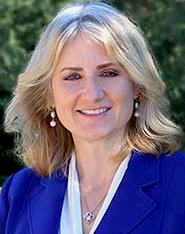 The West Hills Community College District (WHCCD), announced today the retirement of Chancellor Dr. Kristin Clark effective July 2024. For the past two years, Chancellor Clark has served as chair of the Central Valley Higher Education Consortium Board of Directors, which is made up of the chancellors, presidents and campus directors of 28 institutions of higher education in the region’s nine-county area. She also served on the board during her term as president of West Hills College Lemoore prior to the WHCCD chancellorship. The West Hills Community College District will soon initiate a search for a new chancellor. Dr. Benjamín Durán, CVHEC executive director, issued the following statement.
The West Hills Community College District (WHCCD), announced today the retirement of Chancellor Dr. Kristin Clark effective July 2024. For the past two years, Chancellor Clark has served as chair of the Central Valley Higher Education Consortium Board of Directors, which is made up of the chancellors, presidents and campus directors of 28 institutions of higher education in the region’s nine-county area. She also served on the board during her term as president of West Hills College Lemoore prior to the WHCCD chancellorship. The West Hills Community College District will soon initiate a search for a new chancellor. Dr. Benjamín Durán, CVHEC executive director, issued the following statement.
Dr. Benjamín Durán, CVHEC executive director, and WHCCD Chancellor Kristin Clark at the Central Valley Higher Education Summit October 19, 2023 where she delivered the welcome address.
UPDATE July 26, 2024: Chancellor Clark honored at farewell reception (see photo gallery below).
STATEMENT
Chancellor Clark: a champion
of higher education for all
We at the Central Valley Higher Education Consortium along with so many others in the region and the state, are experiencing mixed feelings with Chancellor Kristin Clark’s announcement of her retirement effective the end of this academic year.
We are happy for Chancellor Clark as she completes a stellar academic career this spring in preparation for her retirement but at the same time we are saddened that the Central Valley region is losing a leader of her caliber. As the chair of the 28-member CVHEC Board of Directors the last two years, Chancellor Clark has been a champion of higher education for all and certainly for the initiatives and projects the Consortium has undertaken. She has been instrumental in building our network of Central Valley college and university leaders to speak in a single voice on higher education policy issues.
Additionally, Chancellor Clark is recognized throughout the state as the leader of one of the most innovative and student-centered multi-college districts in rural California. The West Hills Community College District and the communities it serves have been fortunate to receive her professional and personal leadership.
Please join us in wishing Dr. Clark all the best, as she gets ready to explore the next phase of her life. Well done, Kristin!
Benjamín Durán, Ed.D.
Executive Director – The Central Valley Higher Education Consortium
President-emeritus – Merced College
See the WHCCD retirement announcement press release.
Bio – Chancellor Kristin Clark
Chancellor Clark Farewell Reception – CVHEC photo gallery:
Valley’s math ed experts unite to address AB 1705 challenge for student success
Math Task Force Convening Jan. 26:
‘Central Valley Way To AB1705 Success’
With the agenda released this week, over 60 Central Valley math education experts will convene in Fresno Jan. 26 to plan math pathways for student success as they brainstorm within five strands of implementation around Assembly Bill 1705 that goes into effect this summer.
The Central Valley Higher Education Consortium’s “Central Valley Way To AB1705 Success” Convening from 9 a.m. – 3 p.m. at the DoubleTree by Hilton Hotel Fresno Convention Center, will bring together community college math educators, administrators and institutional researchers.
Presented by the CVHEC Math Task Force and facilitated by the Charles A. Dana Center at the University of Texas at Austin, the convening is free with advance registration and includes lunch.
Discussion for the historic convening — with administrators and IR experts joining in the conversation — will center around five strands that the region’s community college math academicians can undertake for student success when the new law goes into effect July 1: Validating Prerequisites; Designing Precalculus for 2025; Math Support Outside and Inside the Classroom; Building an AB 1705 Campus Team; and Guided Self-Placement.
Five Math Task Force members serving as strand leads are: Jeremy Brandl, Fresno City College math professor; Nathan Cahoon and Shelley Getty, both Taft College math professors; Marie Bruley, Merced College dean of Science, Technology, Engineering, and Math (STEM); and Jay Thomas, West Hills College Lemoore math professor.
After the event opens with a welcome and brief introductions, the strand subcommittees open the discussion by presenting reports regarding preliminary strand deliberations over the past few months that started at three meetings the Math Task Force held in the fall.
Participants will then break into tabletop talks for feedback and to brainstorm new ideas, a timeline and next steps followed by report outs of those subcommittee sessions.
Following lunch, the participants will break into their respective college teams to discuss “Preliminary College Plans” in two parts: “Validating Prerequisites Between Now and July 1, 2024;” and “Developing New/Revised Curriculum to Take Effect July 1, 2025.”
“College Team Report Outs” will follow before the final session “Where Do We Go From Here?” looks towards the future and the role of Math Task Force sub-committees, college teams and CVHEC.

Dr. Benjamín Durán of CVHEC with Dana Center reps Joan Zoellner and Tammi Perez-Rice at the Oct. 13 Math Task Force convening in Fresno.
Dr. Benjamín Durán, CVHEC executive director, said, “We are proud that our Central Valley community colleges are leaning in on the expertise of their own math experts to figure out the best way to support our students within the guidelines of the legislation.”
AB 1705 — passed in 2022 for implementation July 1, 2024 — expands the provisions established in AB 705 (2017) by explicitly requiring community colleges not only to place students directly into transfer-level English and math courses but also to ensure that students actually enroll in those courses.
The legislation also establishes that for students who need or desire extra academic support, community colleges shall provide access to such support. The new law clarifies that a community college can require students to enroll in additional concurrent support if it is determined that the support will increase the student’s likelihood of passing transfer-level English or math.
Community colleges have been tasked with ensuring they comply with both AB705 and AB1705 designed to strengthen support for student success and increase degree completion.
CVHEC helped start the conversation by bringing together its Math Task Force — made up of representatives from CVHEC community colleges — and other math educators to discuss ideas and options regarding implementation within the Central Valley community college mathematics community last fall.
In three virtual sessions and one in-person convening in 2023, the Math Task Force created a collaborative “Central Valley Approach” to each, said Dr. John Spevak, CVHEC regional coordinator who oversees the consortium’s Math and English Task Forces.
“Now, for the January session, administrators and researchers are joining the Math Task Force to develop data-driven and college-endorsed solutions that help meet the challenge head on and in unity for the best interests of students.”
The fall inaugural sessions were facilitated by two Dana Center representatives who will return to Fresno for the Jan. 26 convening: Joan Zoellner, M.A., who is the lead for the Dana Center’s Launch Years Initiative; and Dr. Tammi Perez-Rice, Postsecondary Course Program specialist.
Dr. Erik Cooper, assistant vice chancellor of the California Community College Chancellor’s Office Cooper, also participated in the first virtual session to discuss the recent history of math education reform in California and answer questions as well as present the CCCCO’s AB 1705 Implementation Guide and FAQ webpage.
“With the passage of AB 705 then later 1705 – all designed to strengthen support for student success – CVHEC has been moving full steam ahead in assuring that our member colleges and their feeder high schools have a good understanding of the seemingly turbulent waters of the legislation,” Durán said.
Strand breakdown:
- Validating prerequisites — quantitative and qualitative: creating a Central Valley collaborative approach which would help make a strong case with the state. Point person: NATHAN CAHOON, Taft College math professor.
- Designing Precalculus for 2025: An effective single-course prerequisite for Calculus 1 (especially valuable if the state allows in 2025-26 only one prerequisite course for Calculus 1). Point person: JEREMY BRANDL, Fresno City College math professor.
- Math support outside and inside the classroom: What’s working best in the Central Valley, including math lab centers, tutoring, embedded tutoring, supplemental instruction, etc. Point person: SHELLEY GETTY, Taft College math professor.
- Building an AB 1705 campus team: Who needs to be on the team? Math and English professors, IR/IT staff, counselors, administrators, etc. How does it best function? Point person: MARIE BRULEY, Merced College dean of Science, Technology, Engineering, and Math (STEM).
- Guided self-placement: Helping ensure with the best possible questionnaire that students are taking the right math class when they start college. Point person: JAY THOMAS, West Hills College Lemoore math professor.
(Links to recordings of the two previous sessions are available below).
REGISTER – “The CVHEC Way to Math Success — Implementing AB1705” (Jan. 26, 2024)
EVENT AGENDA For questions: centralvalleyhec@gmail.com.
For media inquiries: Tom Uribes 559.348.3278 (text msg) or cvheccommunications@mail.fresnostate.edu
SEE:
- Previous sessions recordings:
CVHEC “AB1705 in the Central Valley” Webinar with Dr. Erik Cooper Oct. 6, 2023
MTF meeting Nov. 17 (10 a.m. session)
MTF meeting Nov. 17 (1 p.m. session)
- Coverage of the fall sessions:
Math Task Force begins discussion of AB1705 implementation – Nov. 17 next (with Oct. 13 photo gallery).
CVHEC Math Task Force meets in-person Oct. 13 for AB 1705 follow-up
NEWS RELEASE – CVHEC Math Task Force: Impactful legislation (AB 1705) Convenings Oct. 6 & 13
- The CCCCO’s AB 1705 Implementation Guideand FAQ webpage.
- The CVHEC Math Task Force
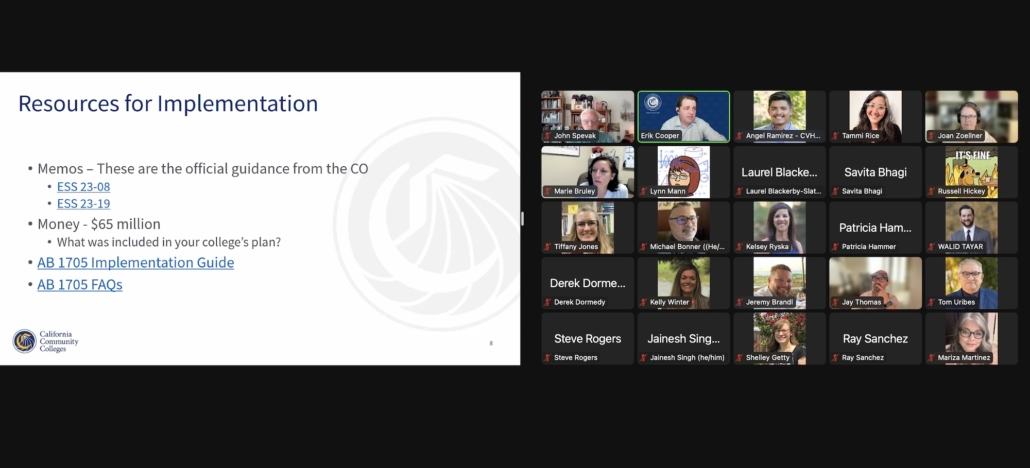
Dr. Erik Cooper of the California Community Colleges Chancellor’s Office zoomed into the Oct. 6 CVHEC Math Task Force session to address AB1705 implementation.
CVHEC $1.5m funding renewal: higher ed strategies for ‘economic, social and educational well-being of valley students’
In a 21-year quest to improve the postsecondary success of students in its region, the Central Valley Higher Education Consortium has once again gained College Futures Foundation (CFF) refunding with a $1.5 million grant to continue championing dual enrollment, math pathways, Open Education Resources/Zero Textbook Costs measures and transfer student support as well as strengthening data access for improved strategy planning.
Dr. Benjamín Durán, CVHEC executive director, announced the new three-year grant (Jan. 2024 – Dec. 2026) from its primary funder this week saying it will allow the consortium — made up of 28 institutions of higher education throughout the Central Valley’s nine-county region that represents one-third of the state of California — “to implement equity-driven strategies that decrease disparities in student persistence and higher education attainment and provide students a timely pathway to completion.
“We appreciate the College Futures Foundation’s continued support for CVHEC activities that are designed to impact student success most efficiently at our member institution,” said Durán, who is president-emeritus of Merced College.
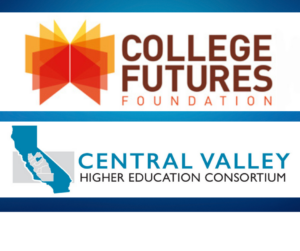 Established in 2005, College Futures Foundation uses a wide variety of human and financial resources and tools — including nearly $20 million in grants annually — towards its mission: increase postsecondary completion for learners who are underserved centering learners and their aspirations and needs on the path to achieving their educational goals.
Established in 2005, College Futures Foundation uses a wide variety of human and financial resources and tools — including nearly $20 million in grants annually — towards its mission: increase postsecondary completion for learners who are underserved centering learners and their aspirations and needs on the path to achieving their educational goals.
“We collaborate with organizations and leaders across California’s postsecondary ecosystem and beyond that share a vision of equity and upward mobility for Californians,” its website states
The partnership between CVHEC and College Futures began in 2016 when the consortium was awarded its first CFF grant.
The long-term vision for the consortium’s CFF proposal is that “initiatives and projects shepherded by CVHEC will result in policies, programs and best practices that will be institutionalized in Central Valley institutions of higher education and will lead to improving the economic, social and educational well-being of the students in the valley.”
Durán added that the funding shows CFF recognizes how CVHEC has intentionally engaged in establishing a cohort of colleges and universities working collaboratively to implement strategies and practices that can help transform the higher education attendance and degree/certificate attainment rates in the region thus creating meaningful pathways for Central Valley students.
With a membership of 28 accredited public and private colleges, universities and community colleges from San Joaquin County in the north to Kern County in the south, CVHEC’s Board of Directors is composed of chancellors, presidents and campus leaders of those member higher ed institutions. As the CVHEC Board of Directors, they speak with a single voice for advocacy, policy and legislation for higher education in the Central Valley region, Durán said.
The CFF grant reflects a commitment to the goals and priorities of the consortium through these five equity-driven strategies designed to decrease disparities in student persistence and higher education attainment for timely pathway to completion:
- Dual Enrollment — expand the dual enrollment course offerings in the Central Valley to enhance opportunities for underrepresented students in rural and underperforming urban high schools and decrease time to degree or certificate attainment.
- Transfer Student Support — increase the number of students transferring with an Associate Degree for Transfer (ADT) to all Central Valley CSU and UC campuses, as well as its non-profit independent institutions members (Fresno Pacific, National University, and University of the Pacific).
- Open Educational Resources — collaborate with the Statewide Real Colleges Task Force and West Hills College Lemoore President James Preston, a member of the SRC Task Force, to form a Central Valley Open Educational Resources Task Force and establish successful models of OER courses at member colleges.
- Data Development – expand the Central Valley Higher Education Student Dashboard to include essential student metrics at all member colleges and universities.
- Mathematics Pathways – collaborate with the Charles A. Dana Center, College Bridge) and Valley colleges and universities to support the scaling of mathematics pathways from high school through postsecondary education and into the workplace, aligned to students’ goals and aspirations.
Other CVHEC projects and accomplishments include serving an integral role in the development of four state-funded K-16 Collaboratives within the nine-county region supporting regional efforts to develop and streamline equitable pathways from high school to post-secondary education and into the work force. CVHEC has initiated the K-16 Collaborative Master’s Degree Upskilling English and mathematics initiative to prepare high school teachers to teach college dual enrollment courses at their high schools, resulting in 100 high school math teachers and 100 English high school teachers earning their Master’s degrees that allows them to meet minimum qualifications to teach college courses at the high school.
CFF funding also supports major CVHEC activities such as its annual Central Valley Higher Education Consortium Summit as well as hosting or participating in other conferences and regional convenings.
BACKGROUND: Founded in 2002, the Central Valley Higher Education Consortium (CVHEC), strives to implement strategies and practices that can help to transform the higher education attendance and degree/certificate attainment rates in the region to create meaningful pathways for students in the region by successfully establishing and engaging a cohort of colleges and universities that work collaboratively towards that end. CVHEC is a 28-member strong consortium of accredited public and private colleges, universities, and community colleges members in a nine-county region of California from San Joaquin County in the north to Kern County in the south. Member chancellors, presidents and campus leaders serve on the CVHEC Board of Directors speaking with a single voice for advocacy, policy and legislation for higher education in the Central Valley region. These institutions of higher education serve 4.3 million people living in California’s Central Valley, a 27,500 square mile region the size of South Carolina that is rural in general, with an extensive array of farms, ranches, small towns and growing cities – including Fresno, the fifth largest city in California. The Central Valley is historically distinctive as one of the most ethnically diverse regions in the United States with challenging socio-economic and college going rates.
MEDIA INQUIRIES: Tom Uribes, CVHEC Communications/Media coordinator – 559.348.3278 (text) or cvheccommunications@mail.fresnostate.edu
WHAT THE CV-HEC IS HAPPENING BLOG (January 2024): CVHEC 2023 — surging forward for Central Valley students
To kick off our 2024 “What the CV-HEC is Happening” Blogs, CVHEC Regional Coordinator Stan Carrizosa, Sr. follows up the year-in-review published in our December newsletter issue by offering a perspective of the consortium’s progress in 2023 that sets the stage for a productive new year. Carrizosa, who is president-emeritus of CVHEC member College of the Sequoias and an integral part of the CVHEC team, serves as the lead for the consortium’s Central Valley Transfer Project. The CVHEC blog features perspectives about the higher education community and issues. Submissions are welcome for consideration: Tom Uribes, cvheccommunications@mail.fresnostate.edu.
Propelling successfully, purposefully like a guided rocket
BY STAN A. CARRIZOSA, SR.
CVHEC Regional Coordinator
(President-emeritus, College of the Sequoias)
As a child, I remember watching a weekly science show called “The Undersea World of Jacques Cousteau” that explored the ocean and marine biology.
One fascinating episode depicted how an octopus at any moment could be moving wildly with all eight legs and not advance at all. But once the octopus contracted its core by simultaneously snapping all eight legs in the same direction, a burst of air coming from the fish propelled it successfully and purposefully through the water like a guided rocket.
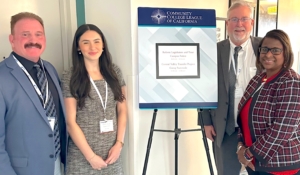
Stan Carrizosa, Sr. (left) and CVHEC Central Valley Transfer Project team partner Tom Burke presented at the Community Colleges League of California in November along with UC Merced grad student Araceli Tilley who discussed her success with the project’s Program Pathway Mapper software and Jennifer Johnson of the Foundation for California Community Colleges (right).
Over the course of the past 12 months, CVHEC has flexed its octopus legs and undertaken otherwise separate projects like Math Bridge and Master’s Upskilling (dual enrollment) and the Central Valley Transfer Project. By aligning them and their sub-parts, CVHEC has achieved the snapping of its octopus legs successfully surging us forward in the form of real achievement results for higher education in the Central Valley and for our region’s students specifically.
As we move into 2024, the work of CVHEC continues to be more aligned in ways that leverage each element and make the wholistic effort more cohesive and successful. This reminds me how effective it was to do this same thing as a college president. It was important to have clear goals and objectives and planned actions designed to address specific aspects of an issue to ensure greater success.
This past year, CVHEC acted like an organization with big-picture goals for improving student achievement region-wide and a measured plan of actions all designed to work together as a system to achieve success.
The two key drivers of this system for CVHEC success are strong intersegmental partnership commitments to:
- a robust dual enrollment;
- increasing successful community college transfers to higher education institutions.
Biggest DE challenge: qualified instructors
Armed with direct feedback from our first Dual Enrollment Summit held three years ago, we heard that one of the biggest challenges to implementing dual enrollment courses was the ability to find qualified instructors to teach college courses on high school campuses.
CVHEC responded by creating an upskilling project where high school teachers in math and English could earn a master’s degree in their content areas and be qualified to apply for and teach dual enrollment college courses on their high school campuses.
Early results from dual enrollment courses showed that students were more successful when the teacher for their college courses was a member of their regular high school faculty. Under the leadership of Dr. John Spevak, CVHEC regional coordinator and vice-president emeritus of Merced College, who facilitated an impressive package offering high school teachers the opportunity to earn a MA degree in their content areas through our partner universities, this opportunity had many residual benefits such as:
- improving the quality of teaching for their high school classes,
- earning higher salaries at their high school,
- creating a professional learning community between high school and community college teachers,
- and most importantly, changing teacher attitudes about the ability for high school students to succeed in college-level work.
The benefits for high school students are enormous.
Those enrolled in college dual enrollment courses experience pass rates of 80-plus percent while mainstream college students pass rates are in the 50 percent range. Finally, dual enrollment has proven to be a game-changer for first-generation college students in closing the equity gap among them and their college prep peers.
If students are able to take their college math and English courses before graduating high school, they start their college career on a level playing field by having completed their first required courses in transfer-level math and English. This enables them to get on the right pathway and stay straight toward their degree completion.
Incentivizing the efforts to increase transfers
The second key driver for CVHEC in 2023 and moving into the new year is the Central Valley Transfer Project!
The breakthrough moment in this project came when UC Merced agreed to review the CSU ADTs and approve these lower-division sequences as meeting the requirements for successful transfer to UCM. Central Valley CSU’s including Bakersfield and Stanislaus have bought in to the Transfer Project as well. Over the past three years CVHEC has worked to complete implementation in eight of our CV community colleges with three more joining the project this year.
Again the student benefit stands clear: early results show that students in the Transfer Project increase their percentages of on-path course completion each semester by 20 points to 80-plus percent. The same students also reduce their number of units to degree from a high of 85 down to 62.
Meanwhile the new statewide Student Funding Formula starts to provide enhanced per/FTES revenue for successful transfers to four-year institutions, further incentivizing the efforts to increase transfers.
We know that of all the successful graduates earning degrees from CSU’s, 50 percent started their education at a community college. Most recently, California Community Colleges Chancellor Dr. Sonya Christian unveiled her VISION 2030 which includes the Central Valley Transfer Project as a Demonstration Project for the entire state. As a result, CVHEC is now being recruited in both southern and northern California to share the success of the CV Transfer Project with those regions through presentations at various convenings.
Thoughtful and effective continuum creating unprecedented leverage for success
In summary, in addition to tracking and assessing our efforts as individual projects, it is equally if not more important to step back and see the bigger picture in the CVHEC body of work for 2023 that sets the stage for promising 2024. We can see there is a thoughtful and effective continuum that links these efforts together creating unprecedented leverage for success:
- CVHEC started by looking at the data and listening to the practitioners in the field to develop an agenda of work to support our colleges.
- Dual enrollment shows great promise but needs more qualified instructors.
- High school students in dual enrollment courses can close the equity gap between them and their peers thus advancing their personal confidence and capacity to succeed in college.
- Most higher ed students start in our community colleges and now through the Transfer Project they have a clear pathway of courses to take for a successful transfer to four-year universities.
- Once our community college students successfully complete their transfer, statistics show that they represent 50 percent of all university graduates.
So, looking back over the past 12 months, CVHEC – like the octopus snapping our legs to successfully surge forward – has successfully linked together major initiatives to build upon and strengthen each other allowing students to experience a continuum of effectiveness and success in achieving their higher education goals and objectives. To close out 2023 and look ahead, our executive director Dr. Benjamín Durán sums up the CVHEC spirit best in his newsletter director’s message published in our December issue:
“This year we are happy to salute and greet our K-12 partner districts who have joined us in creating meaningful pathways from middle school and high school to college. As we prepare to welcome 2024, stay tuned as we continue to nurture many roads leading to one destination – getting students to and through college in a timely manner!”
HIGHER ED NEWS: College Bridge to expand Math Bridge; CVHEC Transfer Project
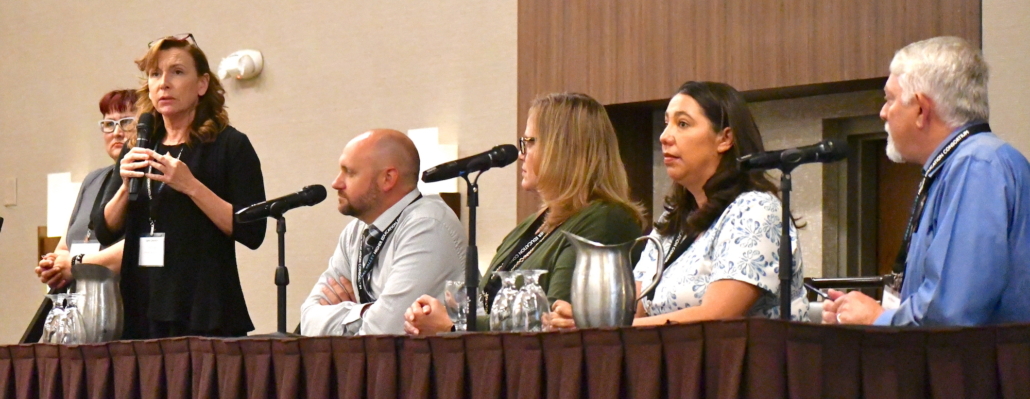
College Bridge President Dr. Lynn Cevallos speaks at the Math Bridge kick off in Fresno May 18, 2023.
College Bridge funded $2.1 million to expand Math Bridge
the ‘Central Valley way’; collaborate with CVHEC Transfer Project
The College Bridge Program, a partner of the Central Valley Higher Education Consortium, has received a $2,196,928 federal grant for expansion of its College Transition Bridge project that, among other features, will advance collaboration with CVHEC’s Central Valley Transfer Project and its college course-planning software, Program Pathway Mapper, as well as with consortium member colleges.
 The College Transition Bridge project is a college counseling initiative created in 2017 that includes a curriculum to meet student needs in preparation for a successful transition from high school to college.
The College Transition Bridge project is a college counseling initiative created in 2017 that includes a curriculum to meet student needs in preparation for a successful transition from high school to college.
With this new three-year grant from U.S. Department of Education Rural Postsecondary Education and Economic Development (RPED) program funds, the College Transition Bridge Project will identify over 2,750 low-income, minority and rural students in the Central Valley to participate in a year-long program that provides students and educators access to college knowledge.
Additionally, the grant will expand the CT Bridge curriculum to include regional workforce needs and streamlined degree pathways to enter the workforce, said Dr. Lynn Cevallos, founder and president of College Bridge, a non-profit organization dedicated to forging a path towards both college access and success for underrepresented students.
“The pathways lead students from high school to community college to the university to career,” she said. “Expanded services are provided to students as well as intersegmental teams of instructors, counselors and administrators.”
She emphasized that “this grant is 100 percent Valley-focused benefiting the identified student population in the California Central San Joaquin Valley.
“And we will be connecting with CVHEC’s proven Central Valley way of doing things as we tie student success to the workforce needs of the region,” she added, explaining that CVHEC leads the partnership efforts connecting workforce needs through aligned college transfer programs between California Community Colleges and the California State University and University of California systems in the region.
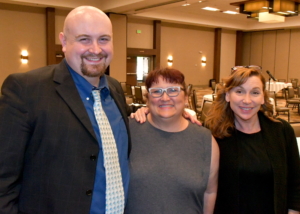
The College Bridge team at the Math Bridge kick off last year: Owynn Lancaster, Dr. Nicole Korgie, Dr. Lynn Cevallos.
College Bridge, based in Southern California but working closely with CVHEC community college members and their feeder high schools in the Central Valley through its Math Bridge Project, is the only California recipient of the RPED program funds awarded Dec. 22 when the Biden-Harris Administration announced $44.5 million in grants to 22 institutions of higher education nationwide.
Funding from the RPED grant program, which promotes the development of high-quality career pathways aligned to high-skill, high-wage and in-demand industry sectors and occupations in the region, is designed to improve rates of postsecondary education enrollment, persistence and completion among students in rural communities.
Cevallos noted that two San Joaquin Valley demographic characteristics drive the need for the federally-funded project: the average per capita incomes are 32 percent lower than the state average; and college graduation rates are 50 percent below the state average.
“Students in the San Joaquin Valley lag far behind in academic performance compared to the rest of the state,” she said. “The region trails the state in bachelor’s degree attainment, with only 12 percent of the adult population holding a bachelor’s degree, compared to 21 percent in the state.”
She said that for associate degree attainment, the region and the state are similar at roughly 8 percent, so this grant opportunity also allows for the revision and expansion of the CT Bridge curriculum regarding:
- Community College Transfer Pathways with an overview of all transfer pathway options but particular focus on the state’s two-to-four-year Associate Degree for Transfer (ADT) Program;
- and the CVHEC Transfer Project’s Program Pathway Mapper (PPM), the software tool that guides students in choosing courses to complete a specific ADT Program.
“In leading the partnership efforts connecting workforce needs through aligned college transfer programs between California Community Colleges and the CSU and UC systems in the region, CVHEC convenes regional partners to review and approve transfer curricula that serve as the basis for the ADT Program,” Cevallos said.
“Faculty from each partner college and university meet to review and approve ADT course requirements. Approved ADTs are loaded into Program Mapper software, which is embedded in College Transition Bridge.”
Dr. Benjamín Durán, CVHEC executive director, said this new endeavor between Central Valley Higher Education Consortium and the College Transition Bridge will streamline and clarify effective college and career pathways for high school students.
“The Central Valley Transfer Project is anchored by the Program Pathways Mapper, a simple, user-friendly but highly effective software platform,” Durán said. “CVHEC will now help integrate the use of the PPM into the college readiness activities provided by CT Bridge as the key planning tool for high school students to identify and chart their pathway to successful completion.”
Cevallos said the math and CT Bridge experience enables students to build their confidence and capacity in math and successfully complete college transfer-level math courses before high school graduation.
“College-level math and English are gateway courses that serve as prerequisites to many other courses important to successful completion and attainment of their desired degree/certification,” she said.
The funding provides the CT Bridge students, while still in high school, a series of college readiness activities such as completing financial aid and admissions applications, reviewing career opportunities in their desired workforce, selecting a major aligned with their desired career interests and planning the necessary sequence of courses, training and timeline for successful completion.
Stan Carrizosa, CVHEC regional coordinator who is the lead for the consortium’s Transfer Project, said
students who benefit from participation in the CT Bridge experience will be introduced to PPM and guided through the readiness details needed for them to plan their college futures from high school to community college and their four-year institution.
“Because so many of the CT Bridge students are first generation college prospects and come from backgrounds underrepresented in college attendance, they often transition to their local community college as their initial pathway into higher education,” Carrizosa said.
He cited the success of a PPM user who was a student panelist at the CVHEC Summit in October.
“Students like Araceli Tilley took full advantage of Program Pathways Mapper by utilizing the course planning software after her transfer from Merced College to continue planning her academic journey at UC Merced where she graduates with a master’s this spring,” Carrizosa noted.
For more information about the College Bridge RDEP grant, contact Dr. Nicole Korgie at nicole.korgie@college-bridge.org.
See:
BACKGROUND: College Bridge’s mission is to identify and eliminate barriers that prevent underrepresented students from progressing to and through college specifically focusing on Black, Latino, low-income and rural students. One of its two objectives is to expand strategic dual enrollment partnerships to serve low-income, rural and Latino students in California’s Central Valley.
The CVHEC Way to Math Success — Implementing AB1705
Registration for “The CVHEC Way to Math Success — Implementing AB1705” set for Jan. 26, 2024 in Fresno is available here.
All math hands on deck!
Central Valley math, admin, IR pros invited to help plan for
AB1705 implementation at ‘The CVHEC Way to Math Success’ convening Jan. 26
A historic convening of the Central Valley’s mathematics professionals will be held in Fresno Jan. 26, 2024 to merge ideas stemming from a series of fall meetings of the Central Valley Higher Education Consortium Math Task Force designed to address implementation of AB 1705 in 2024.
Registration is now open for “The Central Valley Way To AB1705 Success” that will be held from 9 a.m. – 3 p.m. at the DoubleTree by Hilton Hotel Fresno Convention Center for math educators, administrators and institutional researchers. The event, facilitated by the Charles A. Dana Center at the University of Texas at Austin, is free with advance registration and will include lunch.
The convening continues a first-of-its kind year-long discussion of ideas and options within the Central Valley community college mathematics community – CVHEC bringing together Math Task Force members and other math educators — in an ongoing quest for equitable mathematics under AB705 and AB1705.
“With the passage of AB 705 and now 1705 – all designed to strengthen support for student success – CVHEC has been moving full steam ahead in assuring that our member colleges and their feeder high school have a good understanding of the seemingly turbulent waters of the legislation,” said Dr. Benjamín Durán, CVHEC executive director.
“We are using the expertise of our own Central Valley math professors to help find the best ways to respond to AB 1705 with the greatest possibilities for student success.”
CVHEC’s Math Task Force — made up of representatives from CVHEC community colleges — held three virtual sessions and one in-person session this fall, bringing together the valley’s math educator community to look at how to best implement the legislation first passed in 2017 as AB 705 that was followed in 2022 with AB 1705.
Two sessions (Oct.6 via Zoom and Oct. 13 in person in Fresno) were followed with two virtual sessions on Nov. 17 (morning and afternoon), all drawing well over 30 math professors, reports Dr. John Spevak, CVHEC regional coordinator who oversees the consortium’s Math and English Task Forces.
Those inaugural sessions were facilitated by two Dana Center representatives: Joan Zoellner, M.A., who is the lead for the Dana Center’s Launch Years Initiative; and Dr. Tammi Perez-Rice, Postsecondary Course Program specialist.
At the Oct. 6 virtual informational session, Dr. Erik Cooper, assistant vice chancellor of the California Community College Chancellor’s Office, Zoomed in to discuss the recent history of math education reform in California. He fielded questions about the requirements and expectations for community colleges under AB1705 highlighting the CCCCO’s AB 1705 Implementation Guide and FAQ webpage.
(Links to recordings of the two sessions are available below).
“They were lively and productive discussions as we continue to move forward with a Central Valley Model in response to AB 1705 that works toward math success specifically for students in the Central Valley,” Spevak said.
“Now for the January session, administrators and researchers are being summoned to help meet the challenge head on and in unity for the best interests of students.”
The topics at the Jan. 26 meeting will center around five strands relating to AB 1705 that came out of the fall sessions involving CVHEC community colleges, creating a collaborative “Central Valley Approach” to each, Spevak said.
The strands — and Math Task Force professors serving as leads — are:
Validating prerequisites–quantitative and qualitative: creating a Central Valley collaborative approach which would help make a strong case with the state. Point person: NATHAN CAHOON, Taft College math professor.
Designing Precalculus for 2025: An effective single-course prerequisite for Calculus 1 (especially valuable if the state allows in 2025-26 only one prerequisite course for Calculus 1). Point person: JEREMY BRANDL, Fresno City College.
Math support outside and inside the classroom: What’s working best in the Central Valley, including math lab centers, tutoring, embedded tutoring, supplemental instruction, etc. Point person: SHELLEY GETTY, Taft College.
Building an AB 1705 campus team: Who needs to be on the team? Math and English professors, IR/IT staff, counselors, administrators, etc. How does it best function? Point person: MARIE BRULEY, Merced College.
Guided self-placement: Helping ensure with the best possible questionnaire that students are taking the right math class when they start college. Point person: JAY THOMAS, West Hills College Lemoore.
For questions: centralvalleyhec@gmail.com.
For media inquiries: Tom Uribes 559.348.3278 (text msg) or cvheccommunications@mail.fresnostate.edu
REGISTER – “The CVHEC Way to Math Success — Implementing AB1705” (Jan. 26, 2024)
BACKGROUND
Passed in 2022 for implementation July 1, 2024, AB 1705 expands the provisions established in AB 705 (2017) by explicitly requiring community colleges not only to place students directly into transfer-level English and math courses but also to ensure that students actually enroll in those courses. The recent legislation also establishes that for students who need or desire extra academic support, community colleges shall provide access to such support. The new law clarifies that a community college can require students to enroll in additional concurrent support if it is determined that the support will increase the student’s likelihood of passing transfer-level English or math.
SEE:
• Previous sessions recordings:
CVHEC “AB1705 in the Central Valley” Webinar with Dr. Erik Cooper Oct. 6, 2023
MTF meeting Nov. 17 (10 a.m. session)
MTF meeting Nov. 17 (1 p.m. session)
• Coverage of the fall sessions:
Math Task Force begins discussion of AB1705 implementation – Nov. 17 next (with Oct. 13 photo gallery).
CVHEC Math Task Force meets in-person Oct. 13 for AB 1705 follow-up
NEWS RELEASE – CVHEC Math Task Force: Impactful legislation (AB 1705) Convenings Oct. 6 & 13
• The CCCCO’s AB 1705 Implementation Guide and FAQ webpage.
• The CVHEC Math Task Force

